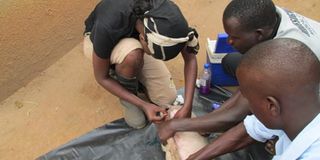Kulika: Where farmers learn about organic agriculture from nature

At the training centre, everything from treatment of farm animals to methods of planting and other agronomic practices are based on the environment and ecological balance. PHOTO BY REBECCA RWAKABUKOZA
When two boars fight at the Kulika Training Centre, they are sprayed with what is referred to as “healing liquid.” The farm headman, Bosco Munyaneza, says it is herbal medicine made at the Centre for wounds and cuts.
He explains that it has four main ingredients: Croton maclstachus, Wandering Jew, goat weed and Mexican Marigold. All these grow somewhere on the 41 acres that the Centre occupies.
It is in Lutisi, Namayumba Sub-county on Kampala-Hoima road, 37 kilometres from the city.
The manager Emmanuel Amen estimates about 65 per cent of the land is in use. There are a variety of food crops (bananas, maize, groundnuts, cassava, sweet potatoes), coffee and trees (mostly pine trees), fruit trees (passion fruit, pawpaws, avocado), vegetables (tomatoes, cabbages, sukuma wiki, eggplants). There are also pigs and goats.
The training centre is owned by Kulika Uganda, an NGO founded by Patricia Brennikmeyer, who was a social worker at Child Welfare and Adoption Society (CWAS) in Nsambya, in the early 1970s.
Starting out
During her time there, she often heard congratulations offered with the word “kulika!” to new mothers, graduates, among others. The organisation draws its name from that.
Brenninkmeyer had special interest in children and nutrition; she decided to start a programme to feed the children.
She set up Warren Farm for Sustainable Organic Agriculture in the UK, staying away from modern farming methods which she believed were harmful to ecological balance and created economic dependency.
The first trainees from Uganda, Elijah Kyamuwendo and Josephine Kizza, arrived at Warren Farm in 1993. There were 27 Ugandans and 11 people from different countries who trained there from 1993 to 2000.
But Warren Farm was far and costly to access, hence the establishment of Kulika Training Centre.
Here, farmers are provided with an intensive 11-month practical training course in Sustainable Organic Agriculture and are awarded with ‘a Post Experience Diploma in Sustainable Agriculture and Farmer to Farmer Extension’ (Saffe).
Farmers such as Scovia Namujju, who graduated from Makerere University with a Social Work and Social Administration degree, decided to farm the land that she and her husband owned.
Principles and practices
The plan was to make a living for her son and two dependent children but she found the land was degraded with low soil fertility; her yields were too low to sustain the family.
She enrolled for the course which set her on a journey as a model farmer, who is able to live solely on the land. “I now have a demonstration garden and people come to learn from me,” Namujju states.
The course involves residential and on-farm training. Other courses offered include a five-month tutor training course.
This one is specifically targeted to people who have completed studies at higher institutions of learning and are practitioners in agriculture, veterinary and community development.
Short courses that range from one day to four months are provided; these are specifically tailored to the needs of the clients. “Most times, it is NGOs who request for these,” Amen says.
Around the farm, sustainable organic farming principles and practices are evident. Trainees will have access to compost making, kitchen gardening, and double dug beds, for example.
There are animal shelters, and Amen loves to point out the detail. “You see that slanting edge? It makes cleaning easy” he says of the water troughs for the pigs.
“The goat shed should have a raised floor and the spacing should be enough to allow droppings through but remain safe for the goats,” he adds.
There is a hall with a capacity for 200 people, dining hall for 80 people and accommodation facilities for 80 participants in 40 double-occupancy rooms. This comes in handy for large groups, who would come for longer periods.
Natural all the way
Solar panels are visible on each of the buildings. “We use biogas energy on the farm. No electricity,” Amen explains. When the biogas energy is not sufficient, it is supplemented with the solar energy. The water supply is from an underground well.
They are keeping everything as natural as they can and make sure that everything is from the environment around them.
When its initial purpose is done, it is reused, repurposed and put back into the system.
Amen and Munyaneza are especially proud of their use of plants to make pesticides and herbicides for the animals and the crops.
When one asks the farm headman what he uses to preserve maize or reports a rat problem, Munyaneza has a ready answer. He will not just provide the name of the herb you need, he will disappear for a few minutes and return with it.




